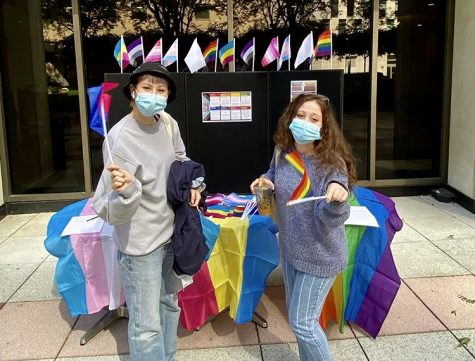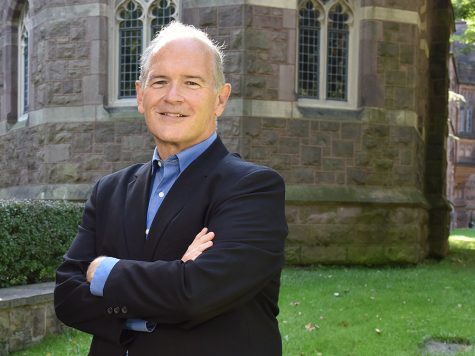Presidential Candidates Trump and Biden Engage in Final Presidential Debate
In the last week of the election cycle, Monika McDermott, a political science professor, said both candidates will continue to focus on increasing voter turnout. (Courtesy of Twitter)
October 28, 2020
President Donald Trump and former Vice President Joe Biden clashed over coronavirus response, national security and a host of other hot button issues in their final presidential debate on Thursday, Oct. 22.
The event, hosted by Belmont University in Nashville, Tennessee, marked a significant tonal shift from the first debate between the two candidates. Moderator Kristen Welker, a White House reporter for NBC News, emphasized the importance of civility at the outset of the night.
“The goal is for you to hear each other and for the American people to hear every word you say,” Welker reminded candidates, referencing the confrontational nature of the previous debate, which featured frequent interruptions and raised voices from both candidates.
Welker also explained that the candidates’ microphones would be turned off when it was not their turn to speak, a change from the last debate.
Robert Hume Ph.D., a Fordham political science professor, said he felt this rule change made the debate more useful to viewers.
“It was substantive and not simply a shouting match,” said Hume. “It was the sort of debate that viewers deserved before the elections.”
In the first segment of the debate, Trump and Biden butted heads over the United States’ response to the coronavirus pandemic. Trump took an optimistic tone, promising the arrival of a vaccine and continued economic recovery.
“It will go away,” said the president. “We’re rounding the corner. It’s going away.”
This is not an accurate representation of the current state of the pandemic, as the country is currently experiencing a third surge in daily reported case numbers, according to a fact-checking analysis of the debate by The New York Times.
Trump also emphasized his decision to restrict travel from China in the early month of the pandemic and criticized Biden for not supporting the policy, claiming Biden had falsely accused him of xenophobia. In response, Biden said that Trump “is xenophobic, but not because he shut down access from China.”
Biden also pushed back against Trump’s optimism about his administration’s response by pointing to the over 220,000 COVID-19 deaths reported this year.
“Anyone is responsible for that many deaths should not remain as president of the United States of America,” said Biden. He also pointed out that a vaccine will likely not be available to the majority of the public until next year.
Timothy Kyle, FCRH ’21, president of the Fordham College Republicans, said he felt Biden’s strategy of attacking Trump’s virus response was distasteful.
“I was pretty uncomfortable with Biden wielding the numbers of dead Americans like a political weapon,” said Kyle. “Every country in the world is suffering terribly right now, and to pretend that a hypothetical Biden administration could have somehow prevented COVID-19 or exempt[ed] America from that suffering is both foolish and disrespectful to the immense effort everyday Americans are putting in to combat the virus.”
However, Kyle said that Biden still performed relatively well overall.
“He’s been known as a decent debater for a long time, and generally followed through, with no major gaffes,” said Kyle. “Strategically, this performance is totally acceptable — he is in the lead nationally and isn’t the one who has to reconvince the American people to vote for him.”
Amelia Medved, FCRH ’23, secretary of the Fordham College Democrats, said she was unsurprised by Trump’s frequent lies and was especially disappointed by the president’s claim that he was “the least racist person in the room.”
“I have no idea who believed him,” said Medved.
Monika McDermott, a Fordham political science professor, said she doubted the final debate would have any major effect on the election outcome. “Debates rarely make or break elections, although they can have small effects at the margins,” said McDermott.
“Mostly they’re remembered, if at all, for any good zingers that come out of them. This one had nothing to make it very memorable,” said McDermott.
Hume said that, overall, the debate primarily functioned as a way for Biden and Trump to rally their bases and motivate supporters to go to the polls on Election Day.
“Because so many voters have made up their minds, the strategy for both candidates is to make sure their own voters turn out,” said Hume. “It is so important, if you care about the outcome of this election, to vote.”
In the last week of the election cycle, McDermott said both candidates will continue to focus on increasing voter turnout, with each side using different strategies to achieve this goal.
“Republicans are using a traditional door-to-door ground game that they’re counting on, whereas Democrats, because of the pandemic, are relying on electronic and telephone contact with voters,” said McDermott. “Each side is using the method that polls show their voters prefer, but it remains to be seen which will be more effective.”












If you want a picture to show with your comment, go get a gravatar.